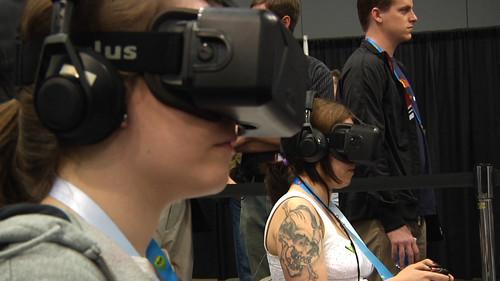
Visitors to the Game Developer Conference in San Francisco tries out an Oculus Developer Kit 2 headset on March 19, 2014
Sony took a tentative step into virtual-reality gaming on Tuesday with the introduction of its Project Morpheus headset for the PlayStation 4, and among those welcoming the move is someone you might not expect: the founder of startup Oculus, a small California-based company that is probably the biggest current name in VR headsets.
"It's really cool to see other people entering the VR space," Palmer Luckey said in an interview at the Game Developers Conference in San Francisco on Wednesday.
"We'll see when we know more about the price, weight, when it's shipping, stuff like that," he added, referring to the lack of details forthcoming from Sony.
The gadget Sony launched on Tuesday is a prototype that's been under development for three years at the Tokyo company, which intends to offer it to game developers at an unannounced later date.
Luckey's point, that Sony's entry into virtual reality will propel development in the space, could be correct. Conversations with a handful of developers who had tried one or both headsets at the event revealed they are all excited about building virtual reality into their games.
"I think it's the last big thing in gaming," Luckey said. "If you can have perfect virtual reality, and we're not perfect, but if you can get there, what other simulation could there be?
"That's super corny and lame to say, because people will make new games and new game play ideas, but in terms of hardware and hardware improvements, VR will eventually be the final step," he said.
At the event, Oculus released a new version of its hardware. Dubbed "development kit 2," the new headset features a high-definition screen, improved orientation tracking and other enhancements.
It will ship to developers in July for US$350. There's no word on when a consumer version will be available.
"We're deep into development on the consumer Rift," the company said in a blog post. "We have a lot more planned, including improvements to comfort, resolution, tracking, software, ergonomics, optics, industrial design, and the overall experience."
Looking into the future, and closer to that point of perfect virtual reality, Oculus is working on developing a completely self-contained headset. Right now, the device needs to be connected to a powerful PC or console for its graphics, and that means a cable.
"Mobile is the long-term future of VR -- having mobile chipsets embedded into the headset itself -- but right now they're not powerful enough to provide the kind of experience that you want to have in VR," he said.
Martyn Williams covers mobile telecoms, Silicon Valley and general technology breaking news for The IDG News Service. Follow Martyn on Twitter at @martyn_williams. Martyn's e-mail address is martyn_williams@idg.com
Join the CIO Australia group on LinkedIn. The group is open to CIOs, IT Directors, COOs, CTOs and senior IT managers.




